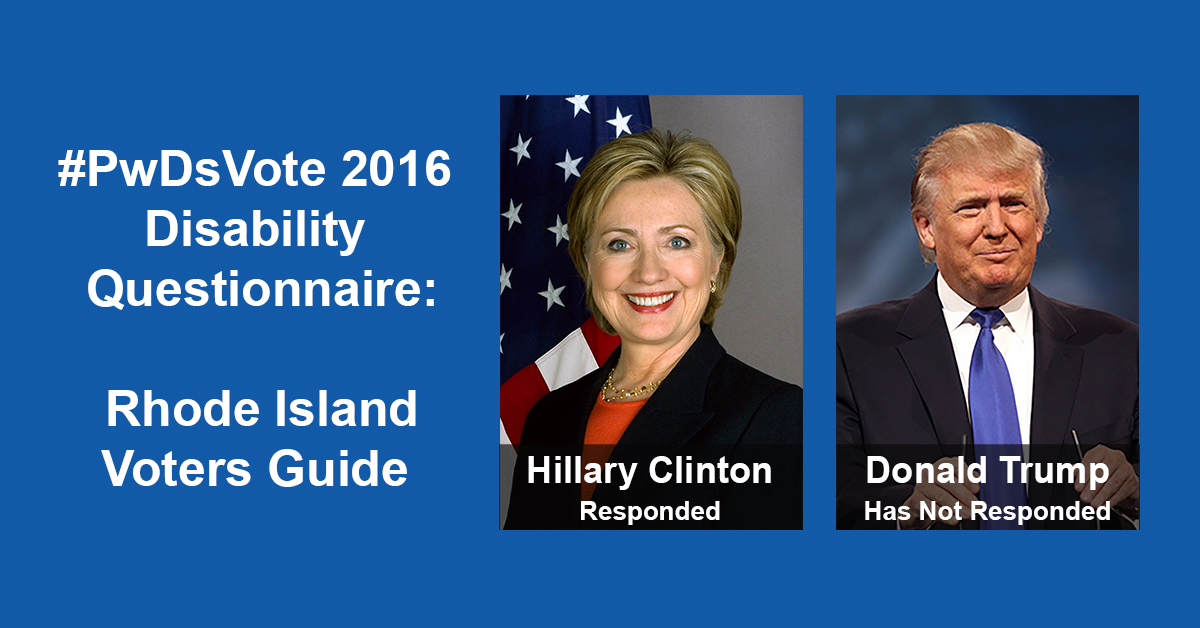NOTE: Since the release of this guide, Rep. Jim Langevin completed the questionnaire. View his responses here: Rhode Island’s Jim Langevin Completes #PwDsVote Campaign Questionnaire.
Washington, Oct. 14 – As voters get ready to head to the polls in Rhode Island, RespectAbility is releasing its Rhode Island Disability Voter Guide for the upcoming presidential election. Democrat Hillary Clinton has completed the #PwDsVote Disability Campaign Questionnaire, but Republican Donald Trump has yet to do so.
The #PwDsVote 2016 Campaign Questionnaire was designed by and for people with disabilities (PwDs) and those who love them to know where candidates stand on key issues. RespectAbility is nonpartisan and does not endorse candidates. The questionnaire is purely for educational purposes as voters go to the polls.
According to a new report from Rutgers University, 35.4 million people with disabilities will be eligible to vote in the November 2016 elections, representing close to one-sixth of the total electorate. That’s an increase of nearly 11 percent since 2008.
The presidential questionnaire was created during the primary season and asked all of the presidential candidates to comment on 16 disability questions. Former Secretary of State Hillary Clinton responded by addressing all of the questions. Despite numerous requests in person and by phone and email, the Trump campaign has not yet filled out the questionnaire. The American Association of People with Disabilities and the National Council on Independent Living also has a nonpartisan presidential questionnaire, which both Clinton and Trump have completed. Libertarian Gary Johnson and Green Party candidate Jill Stein have not filled out either questionnaire.
Twenty-three candidates for Senate, as well as nine candidates for governor, from both sides of the aisle (19 Democrats, 13 Republicans) also completed the down ballot questionnaire, showing that disability rights is a nonpartisan issue. The responses also are geographically-diverse, coming from states all around the country, as politicians are paying more and more attention to the disability community.
Rhode Island Needs to Improve Outcomes for Citizens with Disabilities
Currently, Rhode Island ranks 32nd in the country in terms of the state’s employment rate of people with disabilities. Only 33.9 percent of Rhode Island’s 63,400 working-age people with disabilities are employed. Further, as of 2013, there are 5,000 youth with disabilities between the ages of 16 and 20. Each year, one quarter of them will transition out of the school system and into an uncertain future. View the rankings of all 50 states and compare.
Rhode Island’s voters are looking to know where the candidates stand on important disability issues in order to increase opportunities for competitive, integrated employment for people with disabilities and foster a more inclusive society.
In order to promote best practices and the inclusion of people with disabilities in state workforce systems, RespectAbility has submitted comments for all 50 state’s drafts of the Unified Plan, which is required under Section 102 of the Workforce Innovation and Opportunity Act (WIOA). RespectAbility, founded in 2013, is a nonpartisan, nonprofit organization working to end stigmas and advance opportunities for people with disabilities. It expects outcomes to improve for people with disabilities following the implementation of WIOA, and Rhode Island’s draft offers many encouraging propositions that would further the goals of people with disabilities who wish to achieve the American Dream.
Expanding job opportunities for people with disabilities is beneficial to employers, taxpayers and people with disabilities alike. It is good for employers because the loyalty, talent and skills of workers with disabilities contribute to the employers’ bottom line. It is good for the workforce system because improving services and supports for job seeker with disabilities will benefit others with different barriers to employment. It is good for people with disabilities who want the dignity, pride, friendships, independence and income that a job provides.
Rhode Island’s WIOA plan is structured around three “guiding strategies” that include a “demand-driven sector-based strategy,” “a career pathway strategy,” and “an effective performance measurement strategy.” The disability lens must be actively present in each of these strategies.
In light of recent events, the spotlight is on Rhode Island’s effort to expand employment opportunities for her citizens with disabilities. U.S. v. Rhode Island is the nation’s “first statewide settlement agreement vindicating the civil rights of individuals with disabilities who are unnecessarily segregated in sheltered workshops and facility-based day programs.” With this agreement in place, Rhode Island needs to move forward with focused strategies to empower youth with disabilities to transition into the workforce and become a labor resource well trained to meet employer talent needs.
Rhode Island has a large employment gap between people with disabilities and people without disabilities – 43.8 percent. This lack of employment for people with disabilities creates poverty, powerlessness, and poor health. Studies consistently show that people with disabilities want the opportunity to have the dignity and independence that jobs provide.
America has 1.2 million youth with disabilities, between the ages of 16 and 20. Each year 300,000 of them age into what should be the workforce, but stigmas and lack of knowledge about the capabilities of people with disabilities means that most do not find employers willing to hire them. Young adults with disabilities in all of these states are hoping to find work. They have high expectations and deserve the opportunity to achieve the American dream. Young people with disabilities may simply need some thoughtful help to transition into the workforce. See data on all 50 states here: State Data.
Fully one-out-of-five Americans have a disability, and 52 percent of likely voters have a loved one with a disability. Only 34 percent of working-age Americans with disabilities have jobs, despite the fact that the vast majority want to work. More than 11 million working age people with disabilities are now living on government benefits in our country.
RespectAbility President Jennifer Laszlo Mizrahi said, “Our community is looking for jobs so we can achieve the American dream, just like anyone else. It is vital for us to know where the candidates stand on economic, stigma, education, safety, transportation, housing, healthcare, foreign affairs and other issues.”
Remember to Vote
Rhode Island residents can vote for the candidates of their choice either through the standard voting schedule or through early voting. The deadline to register to vote in Rhode Island was Oct. 9, 2016. For more information, visit: Rhode Island Voter Registration. While Rhode Island does not permit Early Voting, you may apply to vote by mail (Absentee). You do not need an “approved excuse.” Simply fill out the application. For more information, including the application and other instructions: Rhode Island Absentee Voting. Please note: All mail ballots must be received by the State Board of Elections at 50 Branch Avenue Providence, R.I. 02904 by 8:00 p.m. the night of the election (Nov. 8, 2016).





Be First to Comment